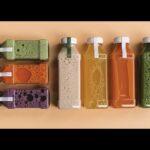Japanese Beverages
When it comes to consumer variety, Japan is a customer’s paradise, and this goes from the rainbow selection of candy-colored cell phones accessible to the various Japanese beverage alternatives sold year-round. Non-alcoholic Japanese beverages, such as tea and soda, are available in a broad range of flavors and kinds in Japan, including limited seasonal tastes that are only available for a few weeks. They are offered at convenience stores known as “combini,” as well as vending machines that sell both hot and cold beverages and may be found on street corners in even the most remote places – and even at the summit of Mount Fuji. Here are some non-alcoholic japanese beverages to try on your next vacation to Japan.
What to Drink in Japan
Amazake
is a sweet fermented rice beverage that is traditional in Japan. Amazake is either totally non-alcoholic or has such a low alcohol level that even children may drink it. Because of its nutritious value, amazake has been relished in Japan since the Edo era and was frequently used to treat summer tiredness. While the drink went out of favor after that, it has recently made a comeback as a “superfood” and is still eaten around holidays like as New Year’s and the Girl’s Day festival Hinamatsuri.
Mugicha
is a tea-like beverage prepared with roasted barley grains and water. The drink has a pleasant, nutty flavor with no bitterness from tea leaves and is caffeine free. Mugicha is commonly served cold in the summer as a preventive for heat exhaustion, but it is also served hot in the winter. Look for it in both the hot and cold vending machine areas.
Genmaicha
is a famous Japanese drink made from green tea leaves with toasted browned rice. The rice adds a less bitter, more balanced, earthy, and toasted flavor to the tea. Some say genmaicha originated in Kyoto, while others believe it arrived in Japan via Korea, which has a long tradition of consuming roasted rice drinks. Genmaicha can be brewed or blended with a variety of green teas, including houjicha (roasted green tea) and matcha.
Canned Coffee
was created in Japan, which resulted in the development of hot and cold vending machines. The canned coffee business is huge now, with major beverage companies vying against one another. Canned coffee variations range from black coffee to café au lait, as well as sweetened and unsweetened coffee.
Royal Milk Tea
Milk tea, as it is known in Japan, differs from milk tea found in other regions of Asia. This is primarily due to poor planning. Unlike traditional milk tea, which is produced by steeping tea leaves in hot water before removing the leaves and adding milk or cream to the hot tea, Japanese royal milk tea is created by boiling the milk and tea simultaneously. To make the drink sweeter, sugar or simple syrup is usually added.
Alcohol Free Beer
Alcohol-free beers have been popular in recent years for individuals who wish to enjoy the flavor and social features of beer without any of the negative side effects, such as excessive calories or an alcohol flush. They are also exempt from the liquor taxes that apply to beer, making them a more affordable beverage.
Soy Drinks
Because soybeans are a major crop in Japan, as well as the frequency of lactose sensitivity among Asians, are a popular beverage. Soy milk may be used in cooking as well as drinking, and it comes in over 50 varieties, including chocolate, strawberry, and banana, as well as more Japanese flavors like black sesame, ume plum, sakura (cherry blossom), and matcha green tea.
Aloe Drinks
are formed from the aloe vera plant’s juice and pulp Aloe offers several health advantages, including anti-inflammatory and antibacterial qualities. Aloe vera, when used topically, heals burns and prevents infection. It has also been shown to be helpful in the treatment of peptic ulcers. Because many delectable aloe vera beverages include a lot of sugar, search for the sugar-free kind for the best health advantages.
Melon Soda
is one of Japan’s most popular soft drinks. It’s a common fixture of the drink bars seen in Japanese family eateries, in addition to vending machines and combini. Melon soda is a vivid green beverage that pairs well with ice cream in melon soda floats.
Yogurt
is widely consumed in Japan due to its numerous health advantages, notably the probiotics that aid digestion and enhance the immune system. Fermented milk beverages have been popular in Japan since the 1930s, and there are now a variety of yogurt-flavored soft drinks on the market. While these soft drinks have a thinner texture, “nomu yogurt,” or “drinkable yogurt,” beverages take it a step further by incorporating live yogurt cultures into a thicker drink with a texture akin to a smoothie.
Was this helpful?
Hi there! I’m a food enthusiast and journalist, and I have a real passion for food that goes beyond the kitchen. I love my dream job and I’m lucky enough to be able to share my knowledge with readers of several large media outlets. My specialty is writing engaging food-related content, and I take pride in being able to connect with my audience. I’m known for my creativity in the kitchen, and I’m confident that I can be the perfect guide for anyone looking to take their culinary journey to the next level.







![Preparing [champ chicken sausage] - raw sausages boiling in a pot and cooking in a pan.](https://milkwoodrestaurant.com/wp-content/uploads/2026/02/image-1-4-150x150.jpg)
